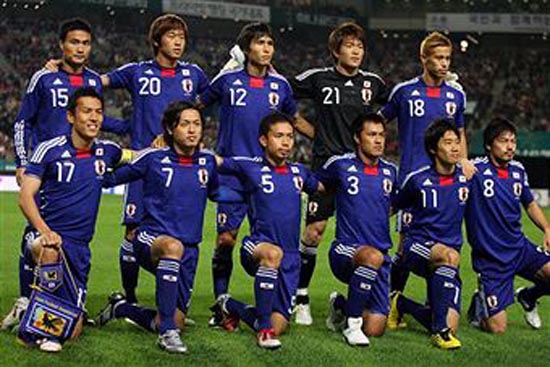By Andrew Warshaw
November 8 – While all manner of allegation and counter-allegation are going on around him, Japan’s 2022 World Cup bid executive director Yuichiro Nakajima is trying to stay cool and keep things clean.
Japan’s pitch to host the finals just 20 years after co-hosting with South Korea may not have generated the same interest as some of the other candidates, but Nakajima is confident the message is getting through – that Japan’s bid, futuristic as it may look now, will present exactly the kind of advanced technology fans will come to expect in 12 years’ time.
Japan’s public relations strategy may have been dwarfed by many of its rivals but Nakajima hasn’t been flying round the world demonstrating his country’s unique approach just to end up being beaten out of sight on December 2.
Last month Nakajima made a presentation at the International Football Arena conference in Zurich attended by, as he put it “keen observers and well-informed insiders” if not by those who will actually vote.
While rival nations stress attributes like fan base, infrastructure, tradition and passion, Japan hopes their strategy of giving the fans all of that and something more will help pick up votes.
“Japan has always been at the centre of technological excellence,” Nakajima said in an interview with insideworldfootball.
“I think there is an in-built amount of credibility that we bring.”
The fact that Nakajima speaks the Queen’s English like an aristocrat without so much as a trace of any Oriental accent, you could almost be forgiven for thinking you were talking to someone from another bid.
Japan may already be also-rans in the minds of some experts but Nakajima is convinced the gamble of focusing on technology will push their 2022 rivals close.
Ever since FIFA’s Executive Committee member Junji Ogura took over chairmanship of the bid in August, Japan’s campaign has been given fresh impetus.
“We have 12 years to make it happen,” Nakajima said.
“Can we do it?
“Yes we can.
“More importantly, people believe we can – we are going to deliver the World Cup in an entirely different way.”
“We’re not going to hog the World Cup to ourselves,” he explained.
“We’re going to share the excitement and experience with everyone.”
The plan is to set up 400 fan fests across the world but like you’ve never seen them before, with high-tech holographic broadcasts complete with flat screens at ground level.

It might sound like a gimmick but technology progresses so fast the Japanese are keen to stay one step ahead.
“The biggest screen will be about 110m by 60m – in other words virtually a full-sized pitch, capable of projecting vertically upwards so that people sitting around a giant screen in, say, Wembley, will be able to see life-size players in front of them without the need to wear glasses.
“The games themselves might be in Japan but we will process the data and transmit it, in real time and life-size holographic images, to wherever you happen to be – rich country or poor country.”
Whether enough FIFA Executive Committee members will be prepared to buy into such innovation remains to be seen.
Nakajima hopes the voting members will do what’s best for their children and grandchildren – not necessarily for themselves.
“If they do, they will realise this is a major shift rather than extension of the World Cup we have come to know – it will be an entirely different beast.”
In the meantime, the Japan campaign is doing its best to distance itself from the ongoing corruption scandal, hoping the honest and respectful way it has been conducting lobbying might even secure unexpected late support.
“Given what’s been happening and what FIFA members are going through now, it would be presumptuous of me to make any guesstimates,” says Nakajima.
“What I will say is that if anything that’s been going on is really true, it has made it so much more imperative to focus on the merits of each bid.”
And would this approach help Japan?
“I’d like to think it helps the entire football world because it has made people sit up and ask themselves what they are here for, and what the World Cup is for.
“From that introspection will hopefully come a vote for the best bid.
“And I believe we have the best bid.
“Why? Because the world is changing.
“In the next 12 years there will be a massive transformation in the way people communicate in every walk of life.
“FIFA cannot stand still and let the world go by without embracing that.
Contact the writer of this story at zib.l1751841001labto1751841001ofdlr1751841001owedi1751841001sni@w1751841001ahsra1751841001w.wer1751841001dna1751841001
Related stories
October 2010: David Owen – Ultra-realism and why World Cup bidding contests as we know them might soon be consigned to history
September 2010: Japan World Cup bid signs up another sponsor
September 2010: Mboma backs Japan 2022 World Cup bid
September 2010: Japan appoints Zaccheroni as 2022 World Cup ambassador
July 2010: Head of Japan 2022 bid set to be forced out of FA

